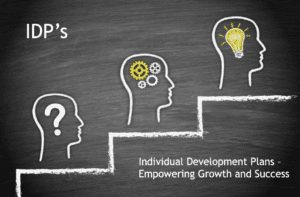Individual Development Plans (IDPs): Empowering Growth and Success
In today’s dynamic workplace, continuous learning and development are essential for personal and professional growth. Individual Development Plans (IDPs) offer a structured framework for employees to identify their goals, acquire new skills, and enhance their performance.
Defining the Individual Development Plan (IDP)
An Individual Development Plan (IDP) is a personalised roadmap that outlines an employee’s professional goals and the steps needed to achieve them. It serves as a strategic tool for self-assessment, skill enhancement, and career growth. IDPs are typically collaboratively developed by employees and their supervisors, ensuring alignment with organisational objectives while tailoring development plans to individual aspirations.
Assessing Current Skills and Competencies
The first step in creating an effective IDP is conducting a comprehensive self-assessment. Employees should evaluate their current skills, competencies, strengths, and areas for improvement. This assessment can include reviewing performance evaluations, seeking feedback from peers and supervisors, and reflecting on personal experiences. By understanding their starting point, individuals can identify the specific skills and knowledge they need to acquire or enhance.
Setting SMART Goals
Once employees have assessed their skills, they can define specific, measurable, attainable, relevant, and time-bound (SMART) goals. SMART goals provide clarity and focus, enabling individuals to measure their progress effectively. For example, a goal could be to complete a specific certification within six months or to acquire advanced proficiency in a particular software tool by the end of the year. SMART goals ensure that development efforts are purposeful and aligned with individual and organisational needs.
Identifying Development Opportunities
After establishing SMART goals, individuals should identify the development opportunities that will facilitate their growth. This can include various activities such as training programs, workshops, conferences, mentoring relationships, job rotations, or stretch assignments. Employees should consider both formal and informal learning opportunities that align with their goals. Collaborating with supervisors, mentors, and HR professionals can help identify relevant resources and development pathways.
Implementing the Plan and Tracking Progress
Once the IDP is in place, individuals should begin implementing their development plan. This involves actively engaging in the identified learning opportunities and consistently practicing new skills. Regular check-ins with supervisors or mentors can provide guidance, support, and feedback throughout the process. It is crucial to track progress and make adjustments as needed, ensuring that the IDP remains relevant and adaptive to changing circumstances.
Evaluating and Celebrating Achievements
Periodic evaluation is essential to assess the effectiveness of the IDP and measure progress towards goals. Employees should reflect on their development journey, evaluate acquired skills, and identify areas for further improvement. Celebrating achievements, both small and significant, boosts morale and motivation. Recognising and acknowledging progress helps individuals stay engaged and committed to continuous learning.
Evolving the IDP Over Time
As employees grow and evolve in their careers, their IDPs should adapt accordingly. Regularly reviewing and updating the IDP ensures that it remains relevant and aligned with changing goals and organisational needs. Aspirations may shift, new skill requirements may emerge, and market trends may influence development priorities. By embracing a growth mindset and maintaining a flexible approach, individuals can proactively respond to evolving opportunities and challenges.
Conclusion
Individual Development Plans (IDPs) provide a structured framework for employees to pursue continuous learning, skill enhancement, and career growth. By engaging in self-assessment, setting SMART goals, identifying development opportunities, implementing the plan, and tracking progress, individuals can actively shape their professional journeys. IDPs empower employees to take ownership of their growth, align their aspirations with organisational objectives, and unlock their full potential. Organisations that promote and support the implementation of IDPs foster a culture of continuous learning, drive innovation, and cultivate a talented and engaged workforce.


